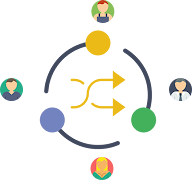
What are DevOps skills? DevOps professionals require a diverse set of skills to effectively bridge the gap between software development and IT operations, automate processes, and optimize software delivery pipelines. These skills can be categorized into several key areas: Automation Skills Scripting Languages: Proficiency in scripting languages like Python, Ruby, or Shell is essential for writing automation scripts and managing infrastructure as code. Configuration Management : Knowledge of configuration management tools such as Ansible, Puppet, or Chef to automate and maintain server configurations. Version Control Git: Mastery of Git for version control, including branching, merging, and collaborating with team members using Git repositories. Continuous Integration and Continuous Deployment (CI/CD): CI/CD Tools: Familiarity with CI/CD tools like Jenkins, Travis CI, CircleCI, or GitLab CI/CD for automating software builds, testing, and deployments. Containerization and Orchestratio




